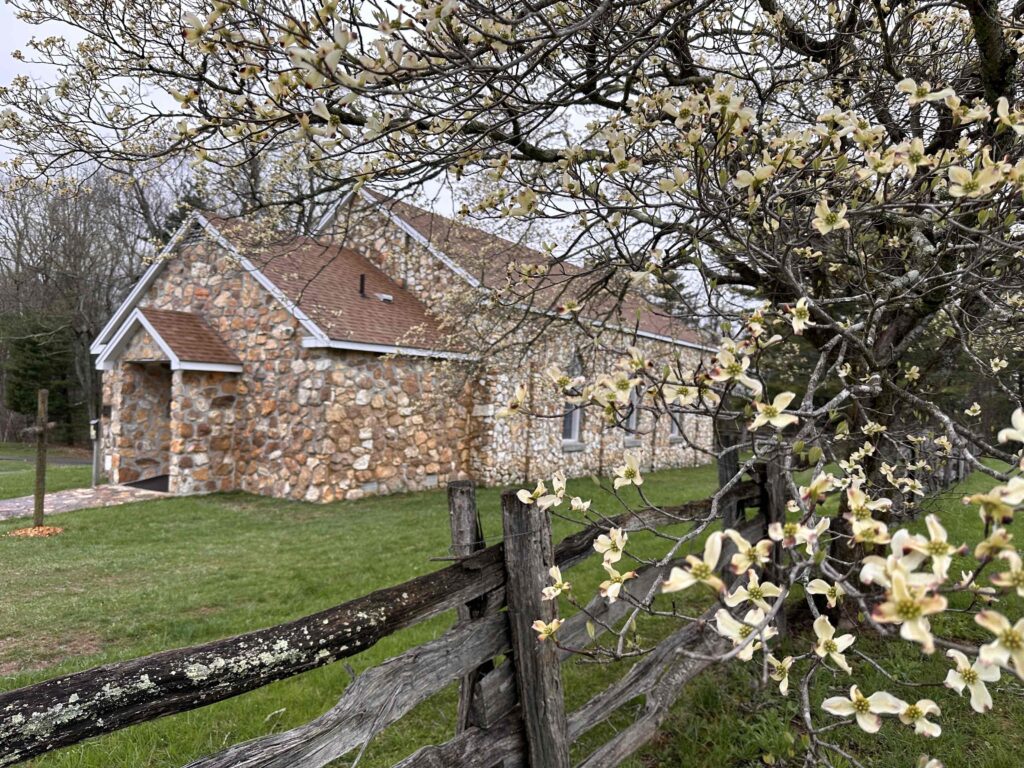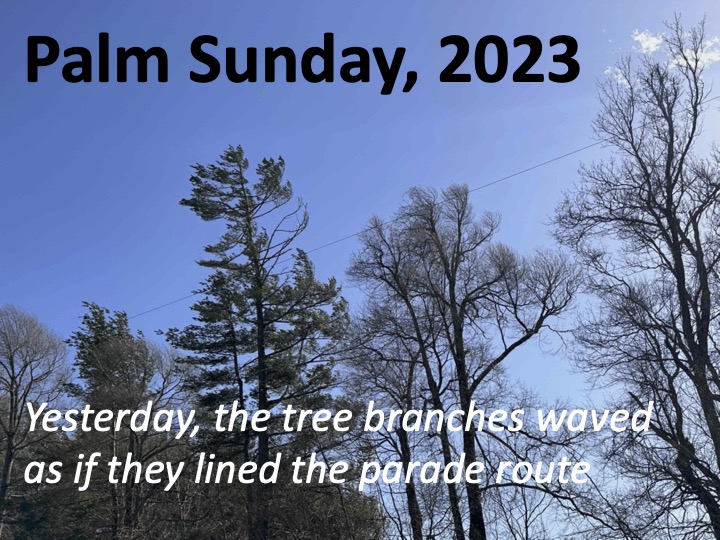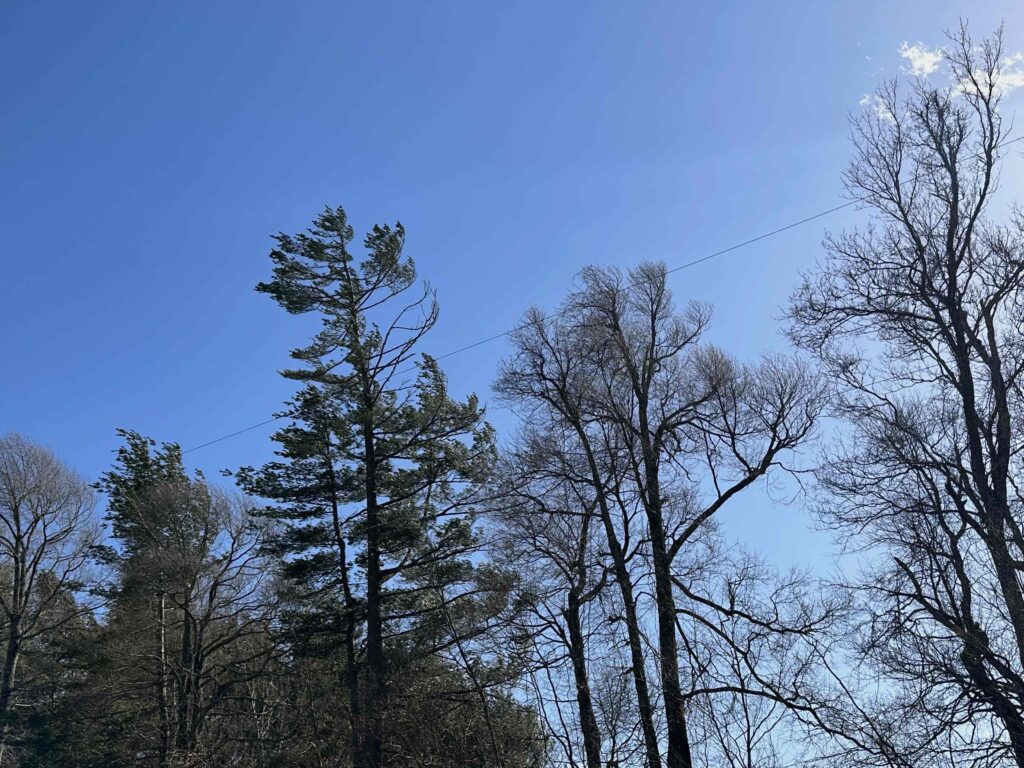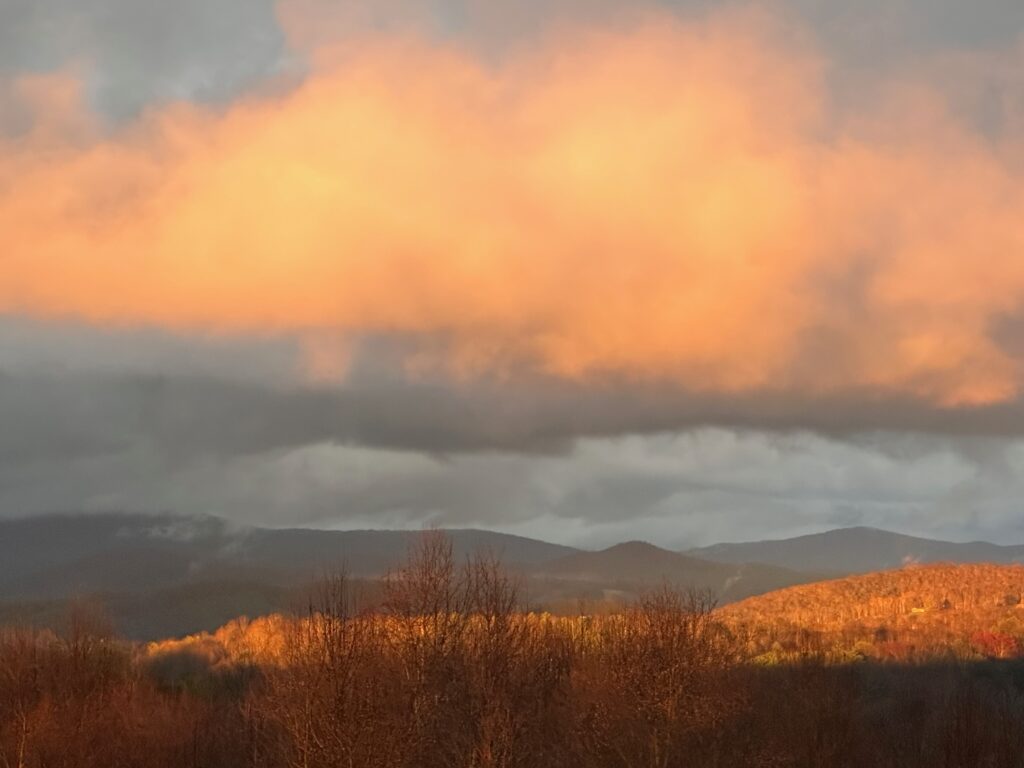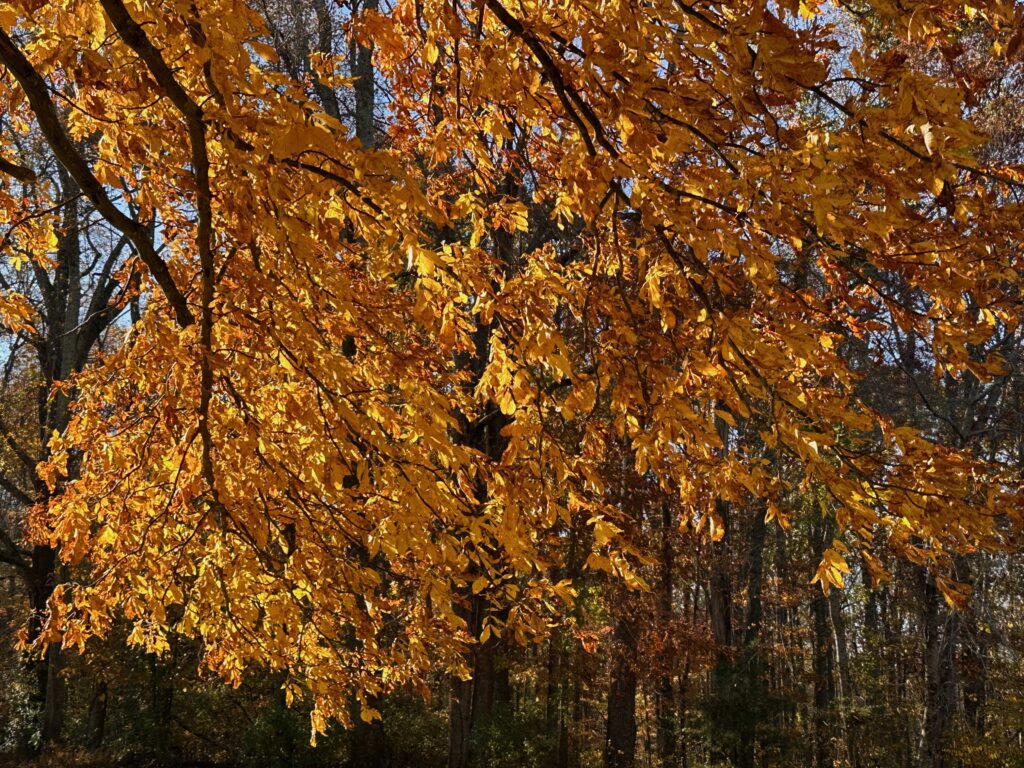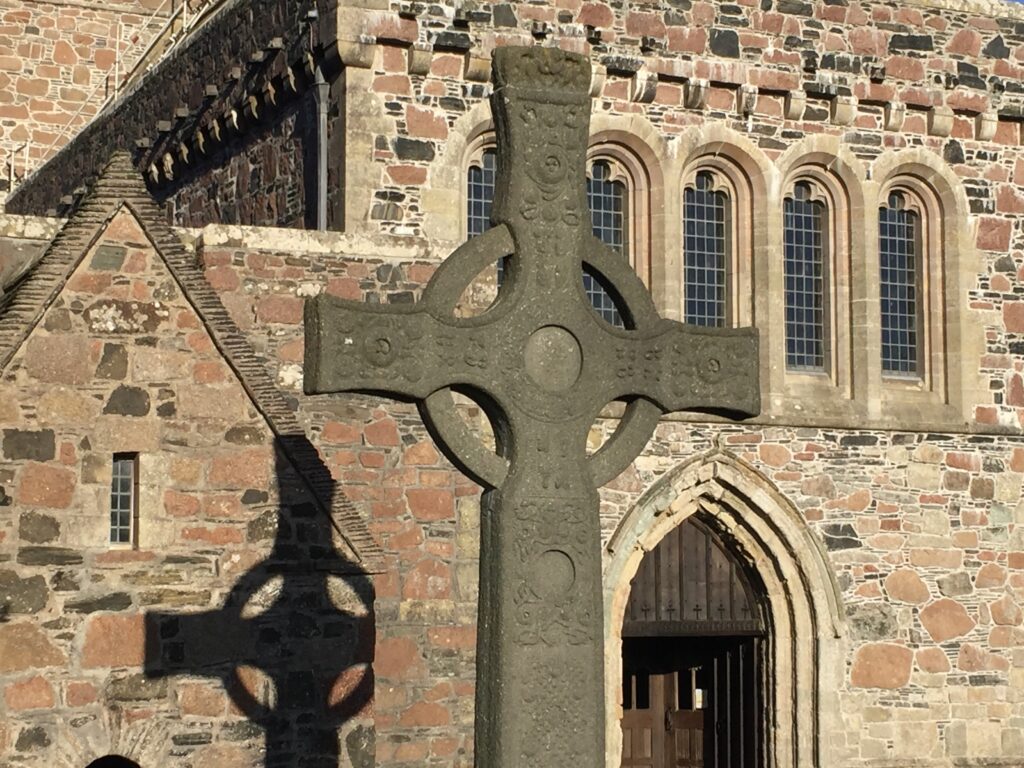Jeff Garrison
Mayberry & Bluemont Churches
Easter Sunday, April 9, 2023
Matthew 28:1-15
At the beginning of worship:
The resurrection happened on the first of the week. It did not happen on the Sabbath, the holy day, but on what in the first century was a workday. Something new occurs. The Sabbath ends at sunset and before the sun rises, the women head to the tomb. God, in Jesus Christ, is resurrected and as Christians, we now hollow this day, the first day of the week, the day of resurrection.[1]
Before reading the Scripture:
We’re reading this morning from Matthew. We might think of this as the story of the resurrection, but that’s not right. None of the gospels tell us about the resurrection itself. Instead, we’re told of the encounters the women and disciples had with the resurrected Christ. The resurrection remains shrouded in mystery, for when the two Marys arrived at the tomb, Jesus was no longer there. Matthew always reminds us that from the beginning there was an effort to cover up what had happened. Listen.
Read Matthew 28:1-15
Once there was a man with a pet lamb. He fed it by hand and played with it every day. When hard times came, he was forced to take his pet lamb to the market to sell. Now there were three thieves who heard of the man’s plan and plotted to take it away from him in a clever way.
Early in the morning the man rose and put the lamb on his shoulder and began the journey to the market. As he traveled down the road, the first thief approached him and asked, “Why are you carrying that dog on your shoulder?” The man laughed, “This is not a dog, it’s my pet lamb and I am taking him to market.
After he walked a little farther the second thief crossed his path and said, “What a fine dog you have there. Where are you taking it?” Puzzled, the man took the lamb off his shoulders and looked carefully at it. “This is not a dog,” he said slowly. “It is a lamb, and I am taking it to market.”
Shortly before he reached the market the third thief met the man and said, “Sir, I don’t think they will allow you to take your dog into the market.” Completely confused, the man took his lamb off his shoulders and sat it on the ground. “If three people say that this is a dog, then surely it must be a dog,” he thought. He left the lamb behind and walked to the market. If he had bothered to look back, he would have seen the thieves picking up his lamb and running off with it.[2]
Are we like the man and the lamb?
Those of us who make up the Christian Church are often like the man with the lamb. We lose our focus by allowing other people’s opinions to shape our vision. To appease the world, some try to conform the gospel to science and popular opinion and end up not knowing what we believe.
The gospel truth
The truth of the Christian faith is that God raised Jesus from the dead. It is not something we can prove. Paul himself, in the first century, admitted that it makes no sense outside of faith, that to non-believers it’s mere foolishness.[3] Our belief in the resurrection cannot be based on empirical evidence. The resurrection is about God’s power, but the story itself must be accepted on faith.
Do people really know what we celebrate today? For some, the idea that Jesus laid in a tomb deader than a doornail and then raised from the dead is a scandal. It’s easier for them to believe the disciples stole the body. Or perhaps, today, it’s easier to believe in some silly bunny, a rabbit who should be the patron saint of dentists, bringing chocolates to the kids.
What are we celebrating?
Or maybe Easter is about the rite of spring. As a child, we brought out our spring clothes on Easter. We took pictures of the family, generally in front of an azalea which bloomed in Eastern North Carolina this time of year.
On Easter, girls once again could wear white shoes. They were allowed them to till Labor Day. Guys could wear lighter colored jackets. I’m not sure who the fashion police were back then, but many mothers lived in fear of them.
Easter has become a holiday whom marketers embrace to sell candy, flowers, hams, and clothes. So, is it any wonder, according to a Gallup poll I heard many years ago, 25% of people in church on Easter Sunday don’t know what they were celebrating?
Forgiveness and Hope: The Church’s gift to the world
Have we, followers of Jesus and members of his church become so lackadaisical that we no longer know what we are all about? Jesus Christ has given the Church two primary things to offer the world which no other organization has: FORGIVENESS AND HOPE. Forgiveness centers around the events on Good Friday, on Jesus’ death for our sin. As Peter wrote in his first epistle, “Christ bore our sins in his body on the cross that we might die from sin and live for righteousness.”[4]
Hope is based on the events of Easter morning itself, of the tomb being empty. It was there in those early morning hours the women and the disciples learned that God’s power is greater than all the powers of evil combined. God’s power extends over the grave. As Christ’s Church, we offer forgiveness and hope to the world, telling the gospel story repeatedly to each new generation.
The Two mary’s and the tomb
According to Matthew, the two Marys went to Jesus’ tomb early in the morning on the first day of the week. It was not yet dawn, but the Sabbath was over. But it was still dark. Anxiety, uncertainty, and fear lurk in the darkness.
Did the women know what to expect at sunrise? It’s doubtful. Two of the other gospels tell us they planned to prepare Jesus’ body for its eternal rest, a required task.[5] Besides, psychologically, this ritual would help them put the death of Jesus behind them and allow them to get on with their lives.
Things happened quickly that morning. There’s an earthquake, then there’s an angel rolling back the stone. Ironically, the guards froze, as if they were dead. Matthew has fun here; the guards that are alive are as if they are dead, while the one who was supposed to be dead in the tomb is out and walking around.
The Earthquake and the coming of the end
Furthermore, the earthquake symbolizes the end of the old order. In Chapter 24, Jesus told the disciples there would be earthquakes before the end and we’ve now witnessed two earthquakes in three days![6] The end is upon us, having begun with the death and resurrection of Jesus. God’s kingdom replaces the older order.. We’re in the last days.[7]
The women are shocked with fear with not only the earthquake, but an angel descending from above and rolling away the stone covering the tomb. Notice, however, this isn’t the resurrection. The angel reassures them that Jesus has already risen and orders them to tell the disciples to meet him in Galilee. Think about this, the resurrection has already occurred. The stone rolled away just opens the tomb, its emptiness serving as evidence of the resurrection.
Suddenly, the women’s lives are changed. They run and tell disciples, only to be surprised when Jesus appears to them. Jesus calls out to them, using a Greek word translated in most Bibles as “Greetings,” but a better translation might be “Rejoice!”[8] “Rejoice” conveys more feeling and power than “greetings” which is just a simple hello. Jesus’ words shock the women, and in awe, they kneel at his feet and worship him.
He gives the women the same instructions as the angel, with only one slight, but very important difference. “Do not be afraid,” he says, “go and tell my brothers that I will see them in Galilee.” No longer are Jesus’ followers just disciples, they are now his brothers.
Go! Run! Tell!
GO! TELL! RUN! These verbs used by Matthew create sense of movement and urgency to get the message out, to let the disciples know that God has raised Jesus Christ. The followers of Jesus had gone to bed on the Sabbath thinking that it was all over. Their friend Jesus had met his end on the cross. But on Easter morning, an open tomb shadows the cross and because of God’s love and action, the followers of Jesus once again have hope.
GO! TELL! RUN! It’s imperative that the message gets out and is spread across the world. Jesus Christ is risen, today!
we accept the resurrection on faith
As I’ve indicated, we accept the resurrection on faith, not on empirical evidence. Obviously, Matthew is not interested in “proving” the resurrection. He tells the story from the eyes of two women, and you may remember that women in 1st century Palestine did not even have the right to testify in court. They would not have been considered creditable witnesses. The disciples were called to believe by faith. By faith they had left their former trades and followed Jesus and by faith they set out for Galilee to see the resurrected Lord.
Like the disciples, we too are called to believe by faith. If we believe by faith, Jesus promises his presence and we will witness his glory.
That first Easter began somewhat obscurely during the coolness of an early morning on the first day of the week. A few women, a disciple or two, and a few guards were all who experienced it and knew that something special had happened.
Most everyone else in Jerusalem, as in the rest of the world, continue with their lives as if nothing happened. But soon the message spread. We are not told how the resurrection happens; only that it changed the disciples. It also has the power to change us.
GO! RUN! TELL! The urgency of those words still applies to you and me. Our troubled world needs to hear about God’s love and power. We may be hopeless like the disciples on that Holy Saturday. But because of God’s power, things can change. God is in control, and we see evidence of this when life is the darkest. Don’t believe the naysayers. Place your trust in a God who has power over the grave. It’s our only hope. Amen.
[1]Frederick Dale Bruner, The Churchbook: Matthew 13-28), (Grand Rapids, MI: Eerdmans, 2004), 779-780.
[2] William R. White, Stories for the Journey (Minneapolis: Augsburg, 1988) 26-7.
[3] See I Corinthians 1:18-31.
[4] 1 Peter 2:24.
[5] The other gospels also include different women attending the grave, but they all include Mary Magdalene. Mark says they were to anoint the body (Mark 16:1; Luke says they came with prepared spices (Luke 24:1), John doesn’t mention spices and has Mary Magdalene coming to the tomb by herself.
[6] Matthew 24:7. The first earthquake occurred during the crucifixion. See Matthew 27:51.
[7] See Bruner, 781-782.
[8] Douglas R. A. Hare, Matthew (Louisville: John Knox’s, 1993) p. 330.
